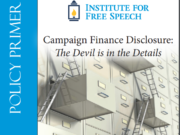Some scholars have argued that information about the financial involvement of interest groups in ballot issue campaigns provides voters with valuable cues about how to vote on potentially complex and confusing issues. In this study, CCP Academic Advisor David Primo argues that the proper way to assess the informational benefits of disclosure is to assess whether the information gleaned from disclosure reports is beneficial to voters at the margin, once all other information available to voters is taken into account. Using a survey experiment, he shows that disclosure information provides few marginal benefits for voters, calling into question the informational rationale underlying disclosure laws.














